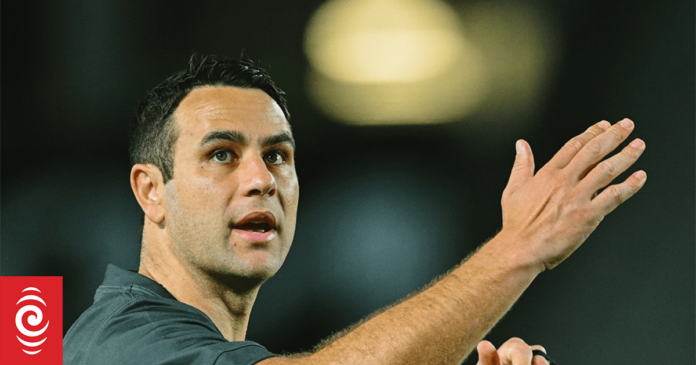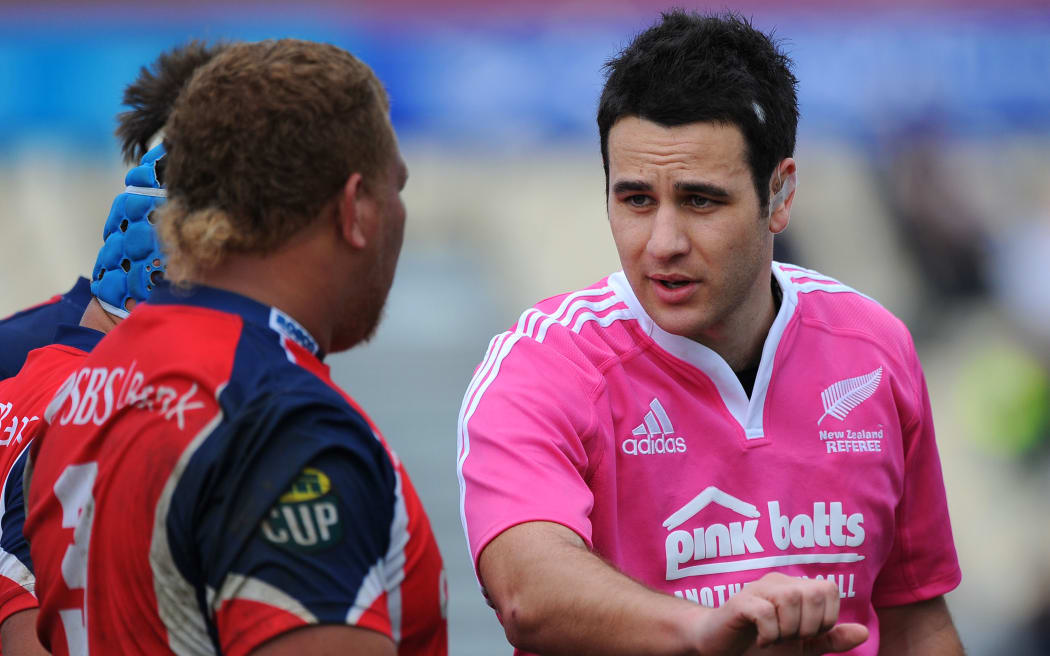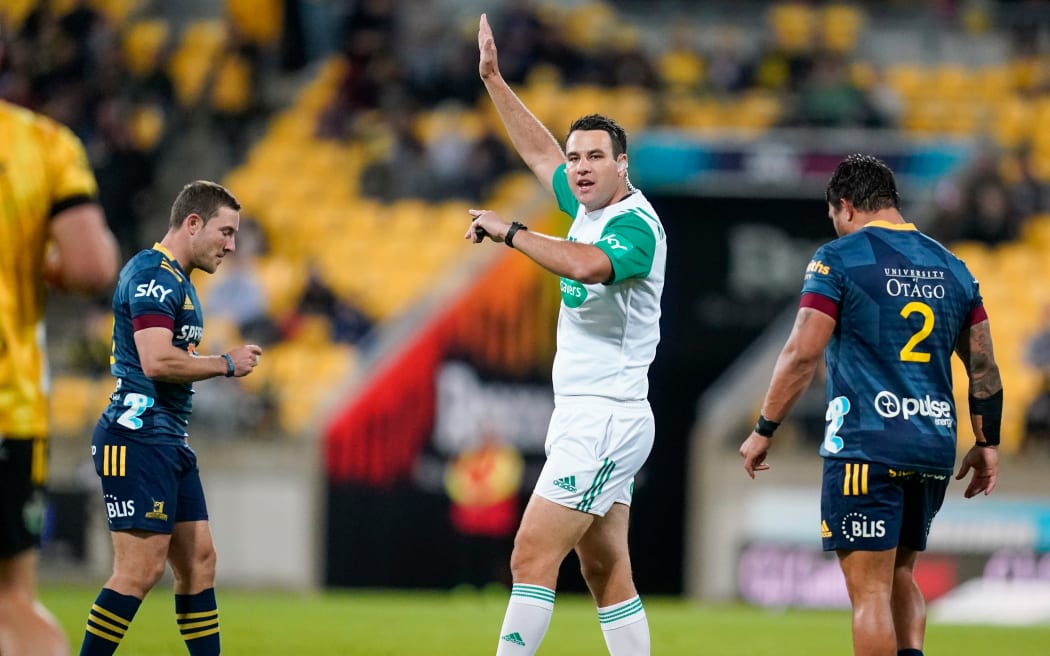
[ad_1]
New Zealand’s most capped test rugby referee, Ben O’Keefe.
Photo: New Zealand Rugby
Ben O’Keefe recently officiated his 47th test match, surpassing Paul Honiss as New Zealand’s most capped test referee.
O’Keefe, 35, achieved the milestone in the Springboks 48-7 win over Argentina in Mbombela at the end of September, which sealed the Rugby Championship title for the hosts.
Honiss’ record had stood since 2008 and O’Keefe said it was an honour to be the ref to finally break it.
“It was an interesting milestone, it sort of crept up on me. To get to 47 tests and to pass some of our all time greats in terms of refereeing was pretty special.
“I feel like I’ve got a lot more to the game and I feel a responsibility to try and keep that number (47 tests) going on and give my experience and help to some of the younger referees coming through test rugby,” O’Keefe said.

Ben O`Keefe during the ITM Cup match between Tasman v Hawkes Bay in 2013.
Photo: Photosport
O’Keefe started refereeing after he stopped playing rugby in his late teens as a University student, though it was not something he had given much thought before then.
“I was 19. So I was at my first year, at university down in Otago. I was studying medicine and I just wanted to stay in the game. I wasn’t playing anymore. I just wanted to keep referring or, you know, keep involved in the game. My dad was a referee in Marlborough where I grew up, but I never saw it as something to do.
“I was always in love with the game, wanted to be an All Black. But he (Dad) sort of suggested that I give it a crack after I stopped playing and while I was at university just to to keep a part of the game and it sort of just kicked off down there.”
O’Keefe made his test debut in 2015, officiating a Pacific Nations Cup match between Fiji and Tonga. He said that milestone was hard to forget and there were several other tests that stood out in his mind.
“A lot of debut games. All those first games at different level, Heartland, NPC. I remember, doing that first game at Eden Park, that was pretty special as well.
“More recently, being part of those big pinnacle games, the second test of the British and Irish Lions series in 2021, the 2019 Japan World Cup, last year’s France World Cup quarterfinals and semifinals. And then even my last game that was in South Africa recently for the Rugby Championship, they’re the ones that stick with you and you just you look back, you review them, and it keeps wanting you to to get involved and get out there and do the next one.”
O’Keefe believed he had another decade in him before he hung up the whistle.
“It’s generally how long the body stays stays healthy and you can sort of keep up with play. I’m 35 now. Some of the top referees, Wayne Barnes, Nigel Owens, Jerome Garces, they’ve refereed up until about 45, 46, 47. So hopefully I’ve got another 10 years in me and another two or three more more World Cups,” O’Keefe said.
“I think if I can stay involved in a game that long, I reckon I’ll be able to offer a lot back to not just grassroots, but young referees coming through New Zealand.”
O’Keefe did not have any refereeing idols as such, but he has learnt a lot from those that came before him.
“I didn’t look up to any one person, but when I was coming through the grades I was I was watching a lot of the senior referees that were around internationally. Paddy O’Brien, Colin Hawke, guys like Craig Joubert, Glenn Jackson, Bryce Lawrence, Chris Pollock. So all these individuals were senior referees while starting, and what I tried to do was take small parts of their game to try and add to my game.
“So I was kind of taking the best of Glenn Jackson’s read on the game, Craig Joubert’s law knowledge, all those things. I was trying to add those skill levels to my game. I felt like it really helped me sort of mould myself into the referee that I wanted to be. So I kinda just picked a lot of good things from everyone.”
The Marlborough man believed communication and personal skills were some of his biggest assets as a referee.
“I feel like for me, my strength has always been the way that I communicate with players. I build relationships with players on the field, and then the way that I communicate tough, big decisions where I’ve used the TMO around grounding or foul play or whatever.
“I always pride myself on how I I train myself to do that. I practice it a lot so that when I am in the big games, when I’m on TV or when, you know, there’s 80,000 people in the stands, I can have a real clear head and actually deliver those messages, which I think are really important.”

Referee Ben O’Keefe. Hurricanes v Highlanders, Super Rugby, Sky Stadium, Wellington New Zealand, 30 April 2021.
Photo: Photosport
But he said he was always trying to improve.
“You can do a game really, really well, but there’s always things that you can work on and I review my games and keep trying to be better. It excites me to know that if I can go another 10 years, I think I’ll be able to really enhance the game and sort of adapt and change if the game changes as well.”
It can be challenging to be a referee, with abuse on social media a growing concern and something that led to the retirement of the most capped ref in test history – Englishman Wayne Barnes – who quit after officiating the 2023 World Cup final between the All Blacks and Springboks, citing regular online abuse and threats.
O’Keefe has experienced that abuse first hand.
“The attention that you get as a referee in the game, post game. So a lot of the media, a lot of the social media stuff, that’s always gonna be a challenge and it’s not just referees, but players, coaches and other people face who face it too.
“But if that is the negative. The great thing is being part of something that’s just such an incredible thing to be involved in when you’re in the middle. You get to meet some amazing people when you’re travelling and the challenges that you face when you’re on the field, when you’re having to constantly work through through decisions, that really helps you grow as a person. I think it’s added to a lot to who I am as a person, and I’m incredibly grateful to be part of it,” O’Keefe said.
“I’ve got a lot of good people around me who support me, my family, New Zealand rugby. It’s just about being open and communicating with them. You go through these things where people contact you, you make bad decisions, there’s headlines, and you just have to work with your family and friends and support networks around that.”
Refereeing has taken O’Keefe around the world and to some of rugby’s most iconic grounds.
“My favourite rugby ground has been, well many of the big ones, Twickenham, Millennium Stadium in Cardiff, Wales. Murrayfield in Scotland I really love. You do a Six Nations game there. It’s foggy and it’s dark, and, you know, you’ve got an amazing anthem that they sing there.
“More recently, I was in Nelspruit at Mbombela Stadium for the Rugby Championship Game between South Africa and Argentina and it’s very rare to get big games up there, but the stadium was packed about two hours before kick off. The anthem was loud, and the atmosphere was unbelievable. So it’s funny. You always you sort of change your mind every year, but they’re all they’re all pretty special to be to be part of.”
O’Keefe said there were not any particular goals he wanted to tick off as a referee, not even officiating a World Cup final, as he would rather the All Blacks be involved (test matches have neutral referees).
“I love the All Blacks, I’m so supportive of them. I wanna see them do more. So for me, I have done all that I think you really can as a referee and I’m really satisfied with that.
“There’s always a challenge, internally, like game to game. I just wanna be better, whether that’s a club game or whether that is another World Cup game. I would love the All Blacks just to keep winning finals. I want them to go to the next World Cup in Australia and win that final. The last one it didn’t go our way, but I was in the stand there drinking a beer and supporting the team that I love and I’ll be happy to do that again.”
And when he does finally call time on his refereeing career, O’Keefe will return to one of his other passions.
“I’ll be a doctor, I’ll go back to my medicine, which I’m trying to keep my hand in, as I’m working as a referee. I think it’s really important for that balance to manage sort the criticism that comes with refereeing is actually stepping away from rugby and doing a clinic. Maybe a half day every few weeks to get some sort of experience outside of rugby.
“I think it really helps me to sort of to balance everything out. I know that once I’ll be finished with rugby and hopefully that’s in 10 plus years, then I’ll be able to get back into medicine and give back that way.”
[ad_2]
Copyright for syndicated content belongs to the linked Source link

